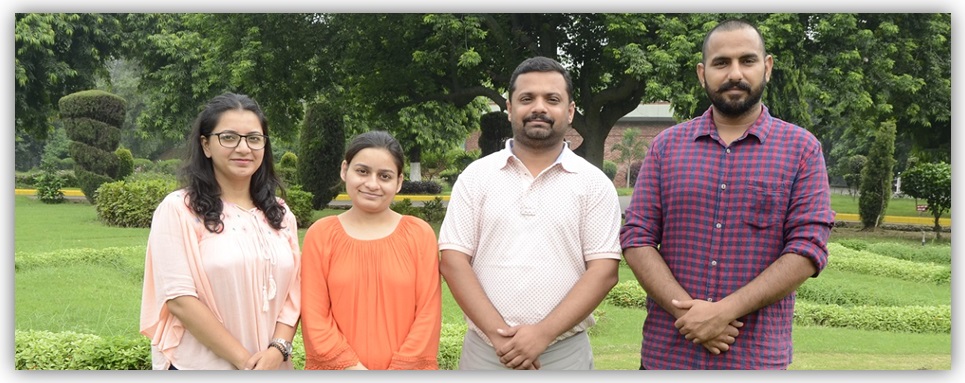
Dr. Amit Tuli
Scientist F
The primary research interest of our laboratory is to understand the function of Arf-like (Arl) small GTP binding proteins that regulate intracellular membrane transport and cellular signaling. There are over 20 Arl GTPases in humans and, the few Arls characterized till date are implicated in regulating diverse cellular processes. Recently, we have characterized function of lysosomal localized Arl GTPase, Arl8, which regulates microtubule-dependent transport of lysosomes and lysosome-related organelles (LROs). Currently we are exploring the role of Arl proteins, in host-pathogen interaction using S. typhimurium and M. tuberculosis as a model pathogens.
- Subhash B. Arya, Gaurav Kumar, Harmeet Kaur, Amandeep Kaur, and Amit Tuli*. Arl11 regulates lipopolysacchride-stimulated macrophage activation by promoting MAPK signaling. Journal of Biological Chemistry, doi: 10.1074/jbc.RA117.000727 (2018). *corresponding author.
This research article was selected as one of JBC's "Editors' Picks" and was rated in the top 2 percent of manuscripts JBC review in a year in significance and overall importance.
The findings of this research were covered in various online news media websites including : thehindubusinessline.com, gstimes.in, firstpost.com, scisoup.com, Wellcome Trust/DBT India Alliance. - Xavier Michelet#,*, Amit Tuli#,*, Huixian Gan, Carolina Geadas, Mahak Sharma, Heinz G. Remold, and Michael B. Brenner*. Lysosome-mediated plasma membrane repair is dependent on the small GTPase, Arl8b, and determines cell death type in Mycobacterium tuberculosis infection. Journal of Immunology, 200(9): 3160-3169. (2018). #equal contribution and *co-corresponding authors.
- Aastha Sindhwani, Subhash B. Arya, Harmeet Kaur, Divya Jagga, Amit Tuli and Mahak Sharma. Salmonella exploits the host endolysosomal tethering factor HOPS complex to promote its intravacuolar replication. PLos Pathogens, 13(10):e1006700 (2017).The findings of this research were covered in various online news media websites including The Hindu , India Science Wire (Vigyan Prasar), SciSOUP, Wellcome Trust/DBT India Alliance
- Rituraj Marwaha, Subhash B. Arya, Divya Jagga, Harmeet Kaur, Amit Tuli* and Mahak Sharma*. The Rab7 effector PLEKHM1 binds Arl8b to promote cargo traffic to lysosomes. Journal of Cell Biology, 216(4): 1051-1070 (2017). *co-corresponding authors.
This research article was selected as “top ten articles of 2017” and was featured in special issue “Year in cell biology: 2017” by the Journal of Cell Biology.
This research article was featured in the list of “top most read” article by the Journal of Cell Biology.
The findings of this research were highlighted by the Wellcome Trust/DBT India Alliance. - Amit Tuli*, Jerome Thiery, Ashley M. James, Xavier Michelet, Mahak Sharma, Salil Garg, Keri B. Sanborn, Jordan S. Orange, Judy Lieberman and Michael B. Brenner*. Arf-like GTPase Arl8b regulates lytic granule polarization and natural killer cell-mediated cytotoxicity. Molecular Biology of the Cell, 24(23): 3721-3735 (2013). *co-corresponding author.
This research article was featured on the cover of the Molecular Biology of the Cell journal December issue. - Patrick J. Brennan, Raju V. V. Tatituri, Manfred Brigl, Edy Y. Kim, Amit Tuli, Joseph P. Sanderson, Stephan D. Gadola, Fong-Fu Hsu, Gurdyal S. Besra and Michael B. Brenner. Invariant natural killer T cells recognize lipid self antigen induced by microbial danger signals. Nature Immunology, 12(12):1202-1211 (2011).
This research article was chosen by Faculty of 1000 Biology, an expert guide to the most important advances in biology, and was evaluated as "must read" with a 9.0 rating. - Salil Garg, Mahak Sharma, Cindy Ung, Amit Tuli, Duarte C. Barral, David L. Hava, Natacha Veerapen, Gurdyal S. Besra, Nir Hacohen and Michael B. Brenner. Lysosomal trafficking, antigen presentation, and microbial killing are controlled by the Arf-like GTPase Arl8b. Immunity, 35(2):182-193 (2011).
This research article was highlighted in the Cell Press published monthly podcasts (September 1, 2011). Also, this article was chosen by Faculty of 1000 Biology, an expert guide to the most important advances in biology, and was evaluated as "recommended" with a 7.0 rating.

Last Modified Date:- 17-12-2025
